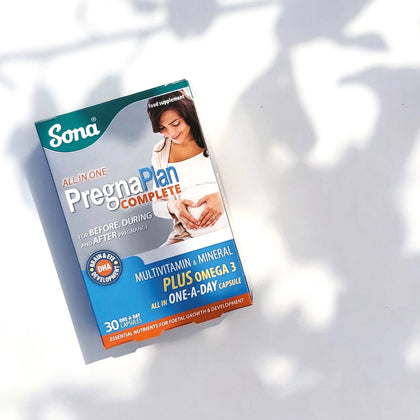
A healthy balanced diet consists of a variety of fruit, vegetables, wholegrains, beans, nuts, and seeds, as well as lean protein. While consuming a healthy balanced diet is important at any stage of life, it is particularly important to do so if you are pregnant or planning to conceive.
In this article you can find:
- What foods should I eat during pregnancy?
- What supplements should I take during pregnancy?
What foods should I eat during pregnancy?
It is important to eat well during pregnancy to provide your baby with the proper nutrients it needs to develop and grow. Foods that are beneficial to consume throughout pregnancy include:
- Fruit and vegetables: Each day, aim to consume at least 5 portions of a variety of fruit and vegetables. Fruit and vegetables are rich in vitamins, minerals, and fibre.
- Starchy carbohydrates: Starchy carbohydrates are an important source of energy. The body breaks down starchy carbohydrates and converts it into glucose, which is our body’s main source of fuel, particularly for our brain and muscles.
- Protein: Eat some foods rich in protein every day. Ensure that all meats and poultry are well-cooked, with no trace of pink or blood.
- Dairy products: Dairy products are rich in calcium. Adequate calcium intake is important during pregnancy as it helps strengthen the baby’s rapidly developing bones and teeth, as well as boost muscle, heart, and nerve development. However, it is important to only consume pasteurized dairy products while pregnant. Unpasteurized dairy products can contain listeria, a bacterium that carries significant risks which can be deadly for unborn babies.
What supplements should I take during pregnancy?
- Folic acid: Folic acid is required for a baby’s cells to divide during pregnancy, as well as for the development of their nervous system. A lack of folate during pregnancy can cause neural tube defects.
- Iron: During pregnancy, your body requires twice as much iron to produce more blood to supply oxygen to your baby. Iron deficiency in pregnancy heightens the risk of a baby having a low birth weight, as well as premature delivery.
- Vitamin D: Vitamin D is important for the absorption and utilisation of calcium and phosphorus in the body, as well an unborn baby’s body.
- Fish oil: Omega-3 fatty acids are critical for fetal development. DHA (docosahexaenoic acid), one of the most important omega-3 fatty acids, is essential for the growth and development of the baby’s brain and forms an important part in the grey matter of the brain tissue. Ongoing research has shown that DHA can also prevent pre-term labor, increase birth weight, and reduce the risk allergies in infants, and the risk of their mothers developing antenatal and postnatal depression.
Sona PregnaPlan is a carefully balanced nutritional supplement formulated for use before, during and after pregnancy. Each capsule includes the recommended levels of 20 essential nutrients including Omega 3 & 6, Iron, Folic Acid and Vitamin D, as well as Vitamin B Complex, C, E and K.
References
- Ding, D., Lo, T., Wu, T., & Li, P. (2019). Effect of Vitamin D supplementation during pregnancy on maternal and perinatal outcomes. Tzu Chi Medical Journal, 31(4), 201. doi: 10.4103/tcmj.tcmj_32_19.
- EHRLICH, G. (2010). Sunshine and Vitamin D. A Comprehensive Guide to the Benefits of the “Sunshine Vitamin”. The Journal Of Rheumatology, 37(2), 475-475. doi:10.3899/jrheum.091173.
- (HSE, 2021). Retrieved 17 June 2021, fromhttps://www.hse.ie/eng/about/who/acute-hospitals-division/woman-infants/clinical-guidelines/nutrition-during-pregnancy.pdf.
- Georgieff, M., Krebs, N., & Cusick, S. (2019). The Benefits and Risks of Iron Supplementation in Pregnancy and Childhood. Annual Review Of Nutrition, 39(1), 121-146. doi: 10.1146/annurev-nutr-082018-124213.
- Planning a Pregnancy - INDI. (2021). Retrieved 17 June 2021, fromhttps://www.indi.ie/fact-sheets/fact-sheets-on-women-s-health/544-planning-a-pregnancy.html.
- Mozurkewich, E., & Klemens, C. (2012). Omega-3 fatty acids and pregnancy. Current Opinion In Obstetrics & Gynecology, 24(2), 72-77. doi: 10.1097/gco.0b013e328350fd34.
- Recommendations: Women & Folic Acid [Internet]. Centers for Disease Control and Prevention. 2018 [cited 8 December 2018]. Available from: https://www.cdc.gov/ncbddd/folicacid/recommendations.html.
- Vitamins, supplements and nutrition in pregnancy [Internet]. nhs.uk. 2018 [cited 8 December 2018]. Available from: https://www.nhs.uk/conditions/pregnancy-and-baby/vitamins-minerals-supplements-pregnant/.
